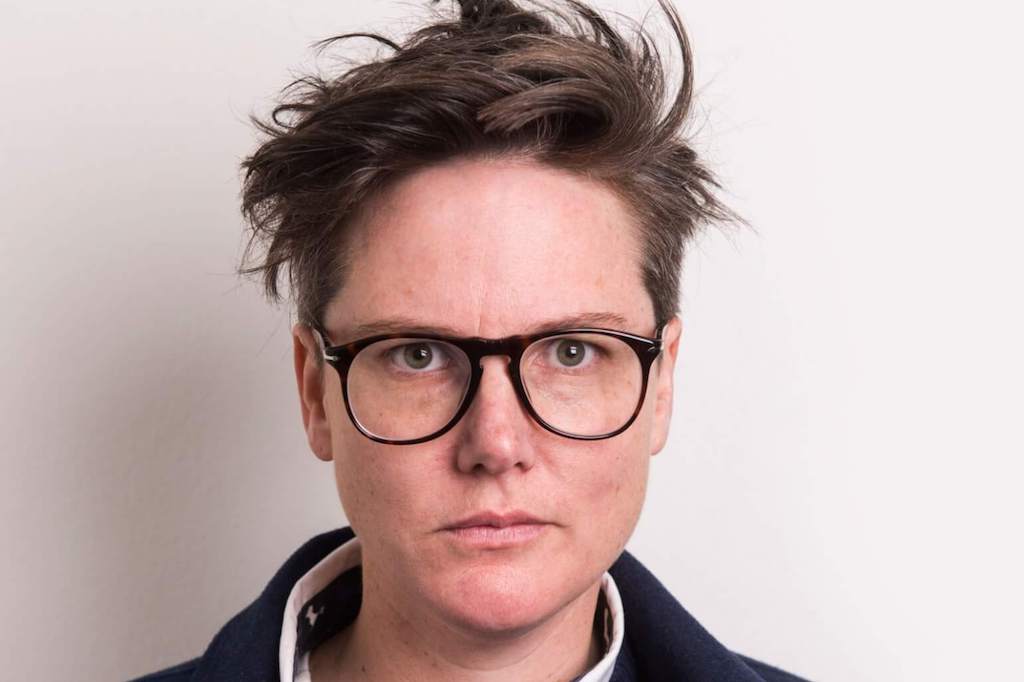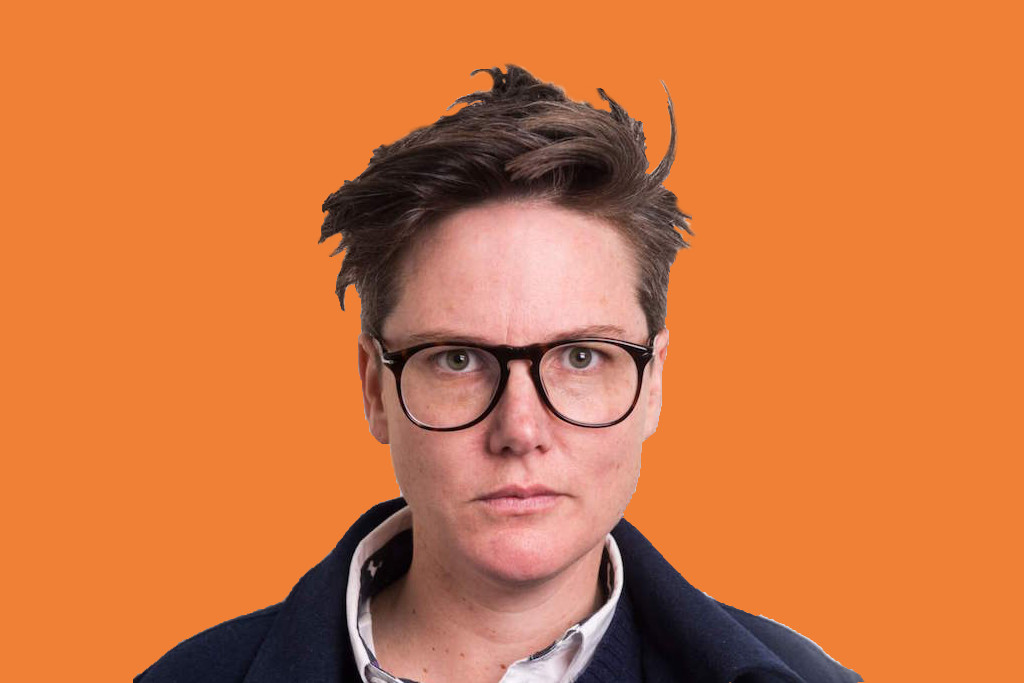Hannah Gadsby On Leaving Comedy, Australia’s Ongoing Bullshit, And That Final Gut-Punching Show
"I feel more connected to the world I live in than I have ever known."

It’s bleak to consider that people can make a living by telling real-life stories of depression and assault — with an audience that laughs and comes back for more. But this is the life’s work of Hannah Gadsby. It’s also the reason she’s decided to no longer write the comedy that’s earned her some of the country’s (and the world’s) highest accolades.
“I don’t want people to come and see anything that I do or take anything I do with the expectation that my number one job is to make them laugh,” she tells me.
Gadsby says funny is in her DNA, but it isn’t her identity. It’s a malleable characteristic that shines through regardless of the environment you place her in. DNA is an interesting term to use. I ask if being funny is inherent to some but not to others.
“People say you can’t teach people to be funny,” she replies. “I would say you can if you bully them enough.”
An Appeal To Australia’s Humanity
Earlier this year, Gadsby announced that Nanette would be her final stand-up performance — and it’s quite a show to go out on.
It’s difficult to pin down exactly what Nanette is about, as it flows through so many themes and stories in Hannah’s life, alternating between laughter and tension. Nanette, whom the show is named after, is a woman Gadsby met. With a name like ‘Nanette’, she says, you’d expect the person to be warm and endearing. She turned out to the exact opposite. Much like Nanette the person, the performance breaks down any preconceived notion of what to expect with conventional comedy, and instead delivers confronting stories fragmented with humour.
Hannah talks about being beaten and left on the curb by a stranger because of her sexuality, misogyny and homophobia through the ages, and how it’s egregious to think artists have to suffer mentally or emotionally in order to produce something worth paying attention to. These things aren’t sugar-coated or made palatable for the audience. This is the life she’s lived and she needs us to know that. As she says, humour is really a coping mechanism.
I wrote about seeing Nanette at Melbourne International Comedy Festival in May, but a lot has happened since. Political and cultural developments like the postal survey result and the #MeToo movement have subsequently changed how Hannah presents her final show in its encore performances. Still, a dominant message prevails throughout the work: no one should feel shame for trying to fit in.
“When you grow up in the margins and you feel isolated, you don’t feel like you belong,” she says. “The only way you can take the shame of that away is by belonging and you can’t do that on your own. You can’t undo shame on your own. The only way we can undo shame is culturally.”
For many, the results of the same-sex marriage postal survey represented a milestone in Australian culture; a win to be celebrated within the LGBTIQ+ community. Gadsby doesn’t totally see it that way.
“A rainbow doesn’t get made without rain, but we can’t keep weathering everybody else’s storm.”
“We have to celebrate it as the right result, but we cannot let go. We need to make sure we don’t put another marginalised group through such a horrific process because this has put seeds of shame through a whole bunch of people.”
I told Hannah I remember waking up half an hour before the announcement of the results. The night before, I fell asleep to a combination of cautious optimism and anxiety. What would tomorrow morning mean for people like me?
After being asked by my housemate if I was nervous, as if I was capable of feeling anything else at the time, the results were declared. I exhaled and went back to my life. It came out the way we’d hoped, but at the cost of months of much-needed stability.
“It’s important for people to remember that a rainbow doesn’t get made without rain,” she says. “We can’t keep weathering everybody else’s storm.”
Ultimately, Gadsby believes “we were collateral damage for factional politics”. It’s a commonly held belief — that Malcolm Turnbull’s been pandering to the conservative wing of the Liberal Party by condemning a marginalised community to months of limbo and abuse. Doubt over how the postal result survey will turn out infiltrated and lingered through the LGBTIQ+ community.
“No one who voted ‘no’ had that doubt because it wasn’t personal to them, it was cultural.”
“I Don’t Protect Myself”
In part, Nanette is about advocating for acceptance. It is a frank attempt at reaching out to a bunch of strangers and pleading for them to offer you even a glimpse of understanding.
This has certainly won over reviewers and audiences alike. Gadsby has earned five-star reviews from a range of publications, as well as taking out the top awards at comedy festivals in Adelaide and Melbourne, as well as the prestigious Edinburgh Fringe.
hannah gadsby's nanette is by far the best piece of art i've had the privilege of experiencing this year.
— jini maxwell ? (@astroblob) November 25, 2017
“Nanette” by @Hannahgadsby is hands down the most fucking incredible thing I’ve ever seen. Such pain & strength, & anger & compassion. It’s the most relevant thing to our world right now. More shows in Decembr so please go see it, go feel it. Standing ovation and I left in tears.
— Han yeah nah ? (@Hanpwny) November 18, 2017
Anyone who hasn't seen @Hannahgadsby 's NANETTE do anything you can to get a ticket. One of the best things I've ever seen. She's a genius.
— Lally Katz (@LallyKatz) October 8, 2017
For Gadsby, it’s paid off personally too. Nanette is her favourite show to date, and she says it portrays the art of comedy the best out of all her works. It’s a self-confessed contradiction which argues storytelling is far better than telling jokes, but does so by… telling jokes. The tension of a horrid story is met with a quick one-liner, and repeat.
But sharing intimate and traumatic moments in your life can be harmful and exhausting. When I asked Hannah about how she deals with the effects of sharing such memories day in, day out, she told me, “I’m big enough and ugly enough, you know?”
“I feel more connected to the world I live in than I have ever known.”
“It is a risk… but it has been incredibly constructive for me. The very wonderful side-effect has been that I feel more connected to the world I live in than I have ever known. My experience has been taken. And felt.”
Up until the final 15 minutes of Nanette, everything is “tight” and thoroughly planned out, from tension to release. After which, Gadsby chooses from 30 minutes of material she swaps between each night.
“I think it’s important I don’t feel safe in the last 15 minutes,” she says. “That I am in the room I’m performing in, completely, so I don’t protect myself, which means I am open to the same tension in the room everyone else is.”
It may be her final performance but she’s “not finished with being funny”. Gadsby also has a book — part memoir and part reflection on comedy — expected for released in 2018. Nanette will be touring in the UK and eventually wrapping up mid-2018, ending the theatrical works of a comedian who found resilience in recollection.
In Australia and internationally, there are terrors that make the more vulnerable of us wallow in the occasional moment of despair. Adding in a twist of humour can simultaneously bring more sorrow to the situation, and grant us a brief second to excuse ourselves from the reality. That’s what Hannah Gadsby’s stage presence was all about, and I’m going to miss it.
Nanette‘s last Australian shows will be at the Sydney Opera House on January 20, and the Heath Ledger Theatre in Perth on January 28. Details here.
Caleb Triscari is a writer and former editor of Farrago, the student publication of the University of Melbourne. He tweets at @calebjtriscari.
